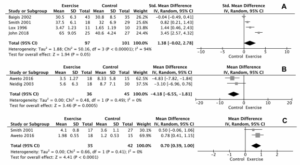30 Mar Impact of supervised aerobic exercise on clinical physiological and mental parameters of people living with HIV: a systematic review and meta-analyses of randomized controlled trials
 Kalatzi P, Dinas PC, Chryssanthopoulos C, Karatzanos E, Nanas S, Philippou A. Impact of supervised aerobic exercise on clinical physiological and mental parameters of people living with HIV: a systematic review and meta-analyses of randomized controlled trials. HIV Res Clin Pract. 2022 Mar 30:1-13. Epub ahead of print. PMID: 35352630.
Kalatzi P, Dinas PC, Chryssanthopoulos C, Karatzanos E, Nanas S, Philippou A. Impact of supervised aerobic exercise on clinical physiological and mental parameters of people living with HIV: a systematic review and meta-analyses of randomized controlled trials. HIV Res Clin Pract. 2022 Mar 30:1-13. Epub ahead of print. PMID: 35352630.
Abstract:
Background: The benefits derived from supervised aerobic exercise in people living with human immunofeficiency virus- HIV (PLWH) have not yet been clearly identified.
Objective: To evaluate the impact of supervised aerobic exercise on immunological, cardiorespiratory, pulmonary, hemodynamic and mental parameters of PLWH.
Methods: A systematic review was carried out in accordance to PRISMA guidelines. PubMed, Physiotherapy Evidence Database (PEDro) and Cochrane Central Register of Controlled Trials (CENTRAL) were screened up to August 2021, for the identification of English written randomized trials, with participants aged 18 years and older, at any stage of the disease, with or without co-morbidities. The risk of bias assessment was conducted according to the Cochrane Collaboration’s tool for assessing risk of bias. Meta- analyses were conducted using continuous, inverse variance, random-effects model.
Results: Ten studies were suitable for meta-analysis based on inclusion criteria. Supervised aerobic exercise appeared to have beneficial effects on depressive symptoms [mean difference (MD)= -4.18 (confidence interval (CI)= (-6.55)-(-1.81), Z = 3.46, p = 0.0005, I2=0%, n = 2], forced expiratory volume in 1 sec [MD = 0.70, CI = 0.39-1.00, Z = 4.41, p < 0.0001, I2=0%, n = 2], and on the maximum oxygen uptake [MD = 1.38, CI = -0.02-2.78, Z = 1.94, p = 0.05, I2=94%, n = 4] of PLWH. No exercise effect was found for CD4 T-cell count (p = 0.16, n = 5), systolic blood pressure (p = 0.91, n = 2) and diastolic blood pressure (p = 0.72, n = 2).
Conclusions: Supervised continuous aerobic exercise may improve lung function, depressive symptomatology and aerobic capacity of PLWH, however, the small number of available studies and the high heterogeneity concerning VO2max demonstrate the need for more research in this area.
Full Text Link:
https://pubmed.ncbi.nlm.nih.gov/35352630/
![]()


